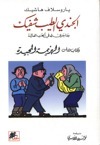


The Fateful Adventures of the Good Soldier Švejk During the World War
Series · 7 books · 1921-2001
Books in series

#1
Behind the Lines
1921
The Good Soldier Švejk[a] (pronounced [ˈʃvɛjk]) is an unfinished satirical dark comedy novel by Czech writer Jaroslav Hašek, published in 1921–1923, about a good-humored, simple-minded middle-aged man who is enthusiastic to serve Austria-Hungary in World War I.

#2
The Fateful Adventures of the Good Soldier Svejk During the World War, Book Two
1923
In Book One of The Fateful Adventures of the Good Soldier Svejk During the World War Jaroslav Hasek wrote about the familiar world he lived in and wrote about his whole life before the onset of the "War to End All Wars". Book One introduces that world to those who are not familiar with it. For those "in the know" it is a hilarious stroll down the familiar the pubs, cops, politics, houses of ill repute, eking out a living. Even after Svejk already joined the military, life goes on as usual. He and his cohorts might be in uniform, but frequent the same pubs, interact with the same people under similar circumstances. The military is not much different than the police. It's just another uniformed service diminishing one's options and pleasure, only to be outwitted and largely ignored. Book One sets the stage for what follows once Svejk moves out with his outfit to go to the front. As the text, now continuing in Book Two, progresses, it becomes clear that The Good Soldier Svejk is not a book meant for the light entertainment of the leisure class. There have been quite a few "livingers", people making a living from interpreting what Hasek meant by what he wrote, who or what svejk is and arguing among themselves. If the common working people find the text funny or even hilarious, it is because, as Don DeGrazia put it, it is "a bellowing barroom brawl of a book that will forever have everyday people doubled-up with the painful laughter of recognition". Such laughing people know svejk without having to analyze him or the text he lives in. On the other hand, if you want to take that route, you will find a lot of material to confront at SvejkCentral.com.

#3
الجندي الطيب شفيك و ما جرى له في الحرب العالمية (الكتاب الثالث الهزيمة المجيدة) #3
2001
من غير الممكن إعطاء تقييم حقيقي لشخصية شفيك المعقدة ... فهو يلجأ متعمداً إلى الغموض وامتهان الجنون بشهادة رسمية... تراه يتحدث معظم الوقت حديثاً مزدوج المعنى... وشروحه مليئة بالسخرية، شأن الكثير من تصرفاته... القليل من الناس، بمن فيهم ممثلو النيابة العامون الصارمون، يستطيعون مقاومة عينيه الزرقاوين الودودتين والجريئتين في آن. وهو ليس أحمق ولا فوضوياً، بل يؤمن بالقانون والنظام، وفي الوقت ذاته، تراه ينضح بالمشاعر والتعاطف الإنساني وبخاصة عندما يعترف بأنه:لا بد للأخطاء من أن تقع.. من الكتاب الذين أدركوا عظمة رواية الجندي الطيب شفيك، بعد كتابتها بفترة قصيرة، ماكس بروك الذي شخّص عبقرية كل من كافكا ويانا تشيك: كان هاشيك ظريفاً من طراز رفيع جداً.. وربما سيضعه عصر لاحق على مستوى نفسه مع سرفاتتس ورابيلييه. لقد رأى ماكس برود شيئاً من سانشو بانزا في شخصية شفيك، وهناك بعض الحقيقة في ذلك.
#4
Osudy dobrého vojáka Švejka za světové války, 4. díl – Pokračování slavného výprasku
1951

#1-4
Vahva sõduri Švejki juhtumised maailmasõja päevil
1921
Švejk oli juba kolmandat päeva välipreester Otto Katzi tentsikuks, kuid välipreestrit ennast oli ta selle aja sees ainult ühe korra näinud. Kolmandal päeval tuli ülemleitnant Helmichi tentsik ütlema, et Švejk tuleks ja koristaks oma välipreestri ära.
Teel jutustas ta Švejkile, et välipreester oli ülemleitnandiga riidu läinud ja klaveri puruks peksnud, ise aga on maani täis ega taha koju minna. Ülemleitnant Helmich on samuti purujommis, visanud teine välipreestri koridori ja see istub nüüd ukse kõrval maas ning magab.

#1-2
Przygody dobrego wojaka Szwejka podczas wojny światowej. Tom I i II
1953
Praški trgovec s psi Josef Švejk se na začetku prve svetovne vojne, tik po sarajevskem atentatu na nadvojvodo Franza Ferdinanda, v svoji najljubši pivnici po neumnosti zaplete v izdajstvo in razžalitev cesarja. Po aretaciji odide v vojsko, čeprav je dobil diagnozo, da je idiot. Ko je v uniformi, spravi ob pamet svoje nadrejene – pijanega kaplana Katza in elegantnega poročnika Lukáša.
Haškov roman je navdihnila pisateljeva osebna izkušnja iz prve svetovne vojne, gre pa seveda za znamenito satiro na položaj vojakov, ki ne razumejo političnih razlogov za svoje bojevanje in se borijo za deželo, do katere ne čutijo pripadnosti. Dobri vojak Švejk je posrečen, ponarodel komični lik vojaka, ki z (ne ve se, ali hlinjeno ali resnično) neumnostjo razkriva absurde vojaške oblasti in absurdne situacije, v katere se spravlja, izrablja kot obliko pasivnega upora proti vojni. Haškova zgodba je tudi polna satire na avtoriteto ter napada korupcijo in hinavščino oblasti.

#3-4
The Fateful Adventures of the Good Soldier Svejk During the World War, Book(s) Three & Four
1923
This is the last volume of the The Fateful Adventures Of The Good Soldier Švejk During The World War containing Book Three and Book Four. Jaroslav Hašek planned to write six books but passed away before completing Book Four. That is why the book is considered unfinished. Yet, it can be argued the author, under pressure from his deteriorating health, indeed completed his thoughts and "closed the books" on the book that made him famous, quite well.
Authors
ياروسلاف هاشيك
Author · 2 books
Arabic profile for Jaroslav Hašek